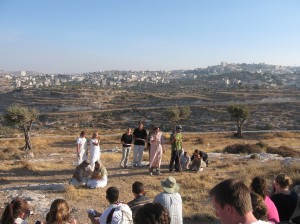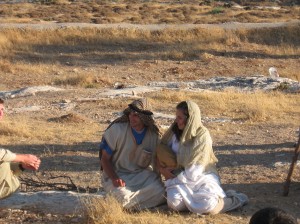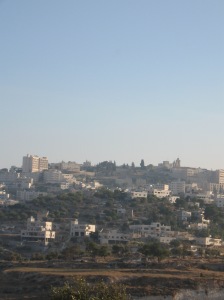Exactly six months ago I was in Bethlehem. It was a fabulous experience. I went to the Church of the Nativity, built over a grotto where tradition holds that Mary gave birth to Jesus. I went to the fields where the shepherds were that followed the star. And I had the opportunity to gain new insights from my professor about the birth of Christ. I want to share some of those insights with you.
The average age at time of betrothal was 12 or 13 for a girl in that day, so Mary was probably about that age. Joseph would have been around 17 years old. What amazing faith in such a young couple!
Inns had a large courtyard for animals, a lower level for cargo, and an upper level for people. This made them ideal for caravans passing the night. There was no room for Mary and Joseph in the inn (upper level), so they may have stayed in the lower level with the cargo and animals or they may have been in a grotto underneath a home. (the Church of the Nativity is built over such a grotto. It was one of the three churches established by Helena, mother of Constantine, who was supposed to erect churches for the most holy sites of Christendom. She would ask around and find out where tradition had it that these events occurred. So even though the church was built around 300AD, it was an important enough event that tradition would have been strong, and the location is probably within a few hundred yards of the real one) However, the greek term used here could also mean “guest room.”
It was normal for young boys to stay with the flocks (recall young David), so the fact that there were older men there that night is significant. They would only have been there because it was the time of birthing. The shepherds were Levites who had been looking for the Savior their whole lives. The lambs being birthed that night were destined for temple sacrifices, being a type and shadow of the sacrifice that Jesus would make 33 years later. This is my favorite insight I picked up about the birth of Christ.
That night there were only shepherds, though—the wise men came later. They were probably Persians, and could be of the Zoroastrian religion. The Bible Dictionary says that they could see the star when others could not (!) and found the young child later on. The three gifts are symbolic:
Item: Use: Symbolism:
Gold Royalty Son of God
Frankincense Used in temples Priesthood
Myrrh Used in burials Coming death
The items were also quite valuable. We see from the sacrifice (a pair of turtledoves or two young pigeons) that Mary and Joseph brought at Jesus’ circumcision that they were quite poor. It is possible that the gold, frankincense, and myrrh were sold to finance the Holy family’s flight to Egypt. I love the way that God takes care of people’s material needs!
Anyway, I hope these insights and pictures help you to picture the Nativity this CHRISTmas season. I love being able to picture the spot in my mind, and I love knowing the deeper significance of certain things.



1 comment:
Thanks for sharing! Very interesting. I'm envious of your experience!
Post a Comment